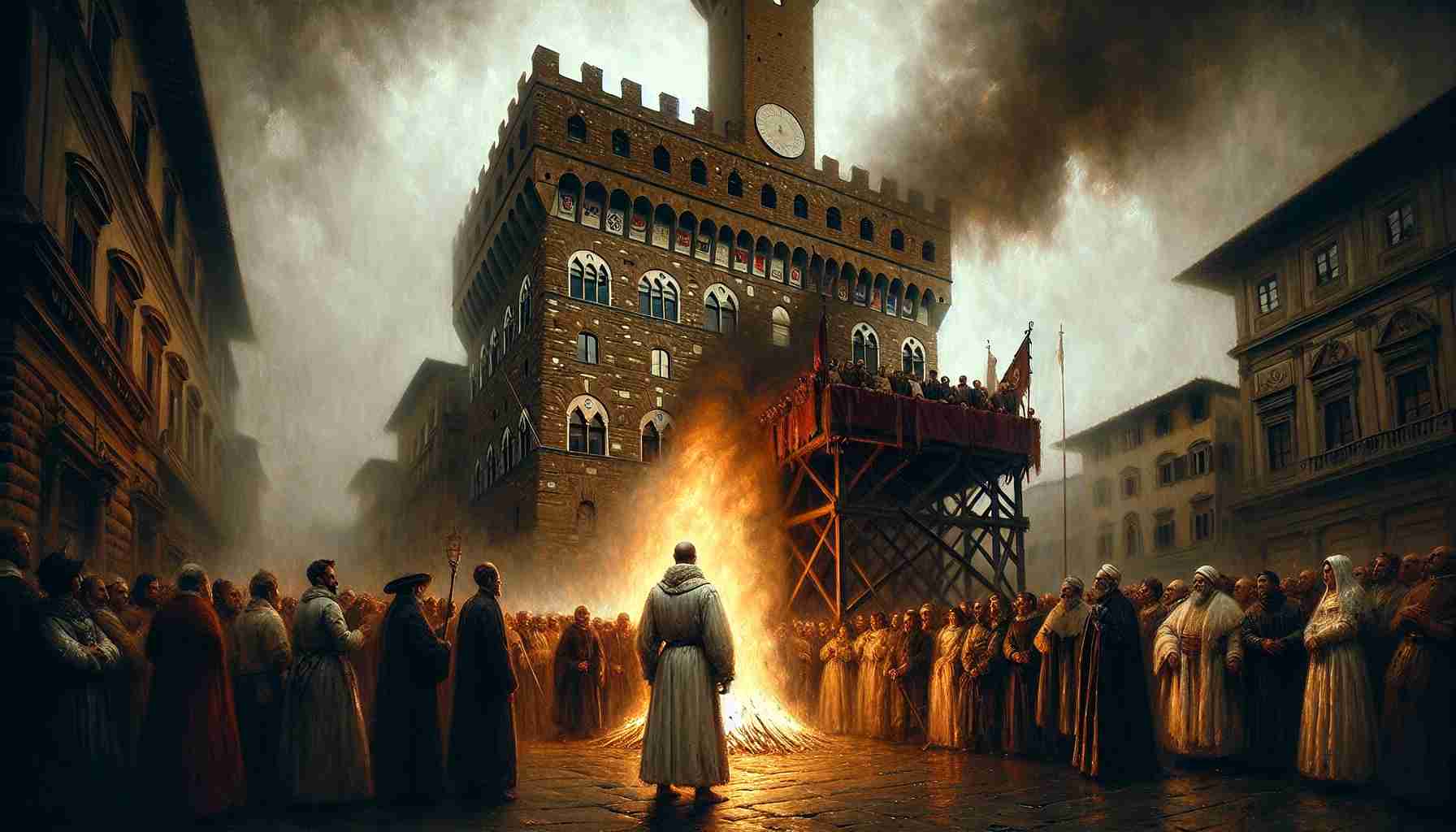

Florence awoke that morning beneath a dome of smoky white sky, as though the heavens themselves hushed for judgment. The square before the Palazzo della Signoria shuddered with restless bodies, murmurs trembling like a thousand gravestones. From under iron-guarded balconies draped in scarlet velvet, nobles watched with tight jaws. The poor pressed forward, robes threadbare and faith fragile in the soft light of morning. All eyes turned to the scaffold.
It had been built swiftly upon the stones where bold voices often echoed—voices that moved a city to art, to pride, to war. Today, it would host silence. Flames would speak in place of words.
In the center stood Girolamo Savonarola.
The Dominican friar’s bare feet were grey with dust, ashen as the cord about his waist. His shoulders stooped from months in a damp cell beneath the Palazzo’s weighty stones, but his eyes—those deep, cumbersome eyes—held like wrought iron. They saw past the spitting crowd and the bishop's condemning scroll. They burned beyond fire or flesh.
A trembling boy clung to the hand of his mother in the crowd. His name was Luca, son of a merchant’s assistant who had once joined the very processions Savonarola commanded. He had marched in the Bonfire of the Vanities, tossing playing cards and gilded mirrors into the flames with trembling conviction. That day he had tasted the sweetness of purged conscience, the clarity of holy fear.
From the raised platform, Savonarola’s voice wrestled against the din. Only those nearest could hear.
“The Lord says, ‘Let justice roll down like waters, and righteousness like an ever-flowing stream.’” His lips scarcely moved.
The bishop flinched at the scripture. Amos 5:24—Savonarola had repeated it for months until even the pious grew tired of judgment. Yet his words had turned Florence inward, made it touch its corrupted belly with both horror and shame. He had dared accuse the Medici, warn the Pope. For that, the choir of power demanded silence.
Behind the friar, bundles of brushwood and dry olive branches waited. A ladder was slid against the post. Ropes tightened. The condemned looked to the heavens, his lips still reciting psalms, barely audible amid the churn of the gathering.
In the crowd, a hushed debate raged.
“He condemned the holy mother church!”
“No, he rose against the devil in her dress.”
“He shamed our city!”
“He called us to remember Christ!”
Luca stared, not truly understanding heresy, excommunication, or the politics that layered Florence like fresco upon fresco. What he understood was that Savonarola had drawn men to their knees not by charm, but by flame. A different kind of fire—one that sparked inside confessionals and market stalls, that unsettled merchants with too much gold and not enough guilt.
Bells cracked through the air. Twin tones, high and low—a dirge.
A match was struck.
The fire took first to the hem of the rope, then jumped greedily to the wood. It moved fast. Faster than the elders expected. Flames leapt like serpents around the pyre, hearts of red and tongues of smoke licking the sky.
Savonarola did not scream.
Some in the crowd fell to their knees. Others spat.
The mother beside Luca wept behind her veil. “May God receive him.”
Above their heads, Florence’s spires pierced the shy clouds—Santa Maria del Fiore’s great dome hung in silent judgment. Brunelleschi's marvel, the pride of the city, seemed to lower its gaze that morning as if ashamed.
And yet it was not over. Not for Florence.
Not for the souls the friar had unsettled.
Rumors would grow in the ashes. That his heart refused to burn. That it was found, unscorched, among the rubble. That angels sang above the Arno when the embers cooled.
Years would pass.
Art would return. Botticelli would quietly repent, painting no more nudes. The Medici would be restored. Popes would come and go. But the echo—that deep, gravelled cry for justice—would remain.
A justice that flowed not from gilded altars or marble seats, but from a deeper well. A stream that refused to dry.
Along narrow streets, the faithful would whisper of that morning when a preacher refused to recant. When he called out sin without a sword, and was answered only with fire.
But long after the fire had died, long after the bells ceased, the verse stayed—carved into hearts as it had been into pulpits:
“Let justice roll down like waters…”
...and Florence would never be able to dam that stream again.